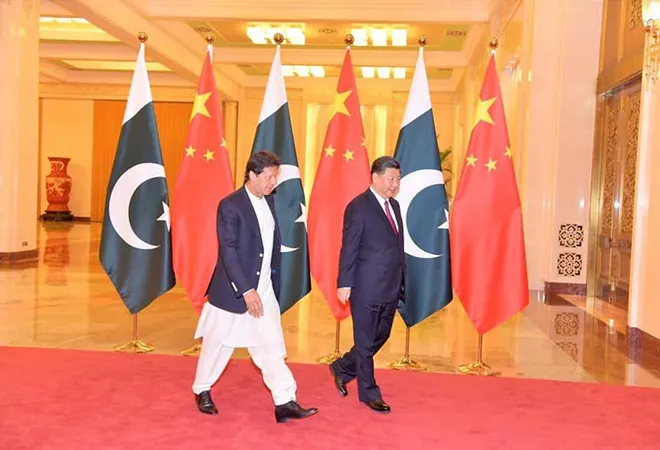Last week, the Chinese consulate in Karachi came under attack with three gunmen trying to enter it and killing four people in the process. While the staff inside the consulate were safe, the foreign ministry in Beijing called for extra measures to protect Chinese citizens in Pakistan.
The Balochistan Liberation Army took responsibility for the attack as it asserted that “we have been seeing the Chinese as an oppressor, along with Pakistani forces”.
Ordering a “complete inquiry”, Pakistan Prime Minister Imran Khan condemned the attack, and called it a “conspiracy against Pakistan and China’s economic and strategic cooperation”. He asserted that “such incidents will never be able to undermine the Pakistan-China relationship that is mightier than Himalaya and deeper than Arabian Sea”.
This attack is part of a series of assaults on Chinese projects and personnel in the restive province of Balochistan over the years as China’s footprint has grown in the region. In August this year, a suicide bombing resulted in injuries to a number of Chinese engineers. Though Chinese interests have been repeatedly targeted over the years, Beijing so far has continued to repose its faith in the Pakistani government’s ability to manage the security situation so as to guarantee Chinese investment.
Balochistan sits at the very heart of the ambitious China Pakistan Economic Corridor (CPEC), China’s flagship investment project in Pakistan, estimated to be worth more than $62 billion. It is being talked about as a potential game changer as it could revive the economic profile of a region that has traditionally been an economic backwater.
Despite being rich in minerals, gas and coal, Balochistan is Pakistan’s most impoverished region, resulting in perpetual political turmoil. Baloch nationalists have gained traction by accusing Islamabad of pursuing exploitative policies and never giving the region its rightful share.
The ongoing tussle between security forces and Baloch nationalists has made the region’s security precarious, diminishing the region’s economic prospects.
Enter China with its Belt and Road Initiative (BRI) as part of which it plans to link its western Xinjiang province with the Arabian Sea port of Gwadar in Balochistan. With a network of highways, railways and pipelines in conjunction with energy, industrial and other infrastructure development projects, the CPEC aims to enhance connectivity across Pakistan and as well as the country’s overall economic growth prospects.
Chinese policymakers also view an overland link across Pakistan to the Arabian Sea as a means of overcoming their nation’s Malacca dilemma given that almost 85% of its oil imports traverse through the single choke point of the Strait of Malacca.
As a result, several infrastructure projects are in the offing as part of China’s investment drive in the region, resulting in an influx of Chinese workers. Given Pakistan’s growing dependence on China, Islamabad remains keen that Chinese projects remain safe and secure.
At the very beginning of this project in 2016, Pakistan decided to create a dedicated CPEC force of 10,000 security personnel primarily to assuage Chinese concerns about the security of the projects. Clearly, that force remains relatively weak to tackle growing challenges to Chinese projects as exemplified by repeated attacks on them.
The CPEC is as much about China’s growing strategic bond with Pakistan as it is about Beijing’s efforts to stem the growing tide of insurgency and radicalism from flowing into its own territory: it is hoping that by generating economic growth and opportunities in Pakistan, it will be able to manage its troubled provinces. But over the last two years, the CPEC has entered turbulent waters.
There is growing domestic political opposition in Pakistan—not only from Baloch nationalists, but also due to widening differences between provinces and the central government—over the allocation of investments.
This has been exacerbated by Pakistan’s economic crisis, which has seen Pakistan’s foreign exchange reserves rapidly depleting and the country facing a mounting balance-of-payments crisis, requiring about $12 billion to meet its liabilities. CPEC has been blamed for part of this problem, with imports of heavy machinery and other equipment resulting in Pakistan’s massive trade deficit. This was also highlighted by Khan, who wanted to distinguish his approach from that of his predecessor vis-a-vis the CPEC by focusing on agriculture, job creation and foreign investment.
As the economic crisis has unfolded, Pakistan has already decided to prune various projects, such as the $8.2 billion railway project between Karachi and Peshawar, to reduce its debt. Several other projects too have been affected.
After a splashy start, the CPEC is encountering serious challenges. Pakistan is facing a difficult global environment on the whole. Its relationship with the US has nosedived under the Donald Trump administration which has warned the International Monetary Fund against lending money to Pakistan, arguing that a bailout package could not be used to settle Chinese debts.
China is also coming under growing global criticism for its BRI projects with nations as diverse as Thailand, Laos, Sri Lanka, Malaysia and the Maldives all voicing complaints about the terms of the loans from China. China’s debt trap diplomacy is facing a global pushback, and the CPEC cannot remain immune from this.
Recent attacks in Balochistan merely emphasize that challenges for CPEC and for the China-Pakistan economic relationship are only going to mount in the future. Some kind of a reset in Sino-Pak engagement is inevitable.
This commentary originally appeared in Live Mint.
The views expressed above belong to the author(s). ORF research and analyses now available on Telegram! Click here to access our curated content — blogs, longforms and interviews.




 PREV
PREV


